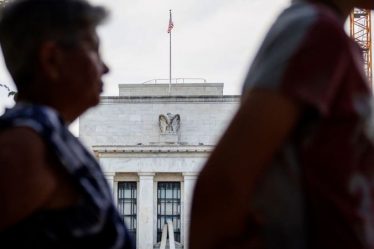(Bloomberg) — A selloff in US assets deepened as President Donald Trump stepped up criticism of Jerome Powell on social media, with stocks, the dollar and longer-dated Treasuries sliding amid concerns about the Federal Reserve’s future independence.
Most Read from Bloomberg
Trump’s assurances that tariff talks were progressing did little to stop the rout. The S&P 500 and other major stock indexes fell nearly 3% each while the dollar index weakened to a 15-month low. The benchmark 10-year fell with the yield close to 4.4%. As investors turned away from US securities, haven assets climbed. Gold jumped to another record, above $3,400 an ounce, while the Swiss franc gained more than 1% against the dollar.
Subscribe to the Stock Movers Podcast on Apple, Spotify and other Podcast Platforms.
The weakness also spread to the US credit market. In derivatives, the cost of protecting a basket of high-grade credit securities against default rose to the highest in more than a week. Three investment-grade companies looked at selling bonds on Monday, but after seeing the market backdrop, two elected to stand down, and only American Express Co. decided to move forward with a sale.
The US president took to Truth Social escalating his attack on the Fed chair insisting there was “virtually” no inflation and it was time for “preemptive cuts.” The last reading of the Fed’s preferred inflation gauge remains above the central bank’s target, there will be a new readout next week.
National Economic Council Director Kevin Hassett said on Friday that Trump is studying whether he’s able to fire Powell. The comments raised new questions about whether the Fed can maintain its longstanding independence with the president increasingly venting dissatisfaction in harsh terms that the central bank hasn’t moved faster to lower interest rates.
“Were Powell to be fired, the initial reaction would be a huge injection of volatility into financial markets, and the most dramatic rush to the exit from US assets that it is possible to imagine,” said Michael Brown, senior research strategist at Pepperstone. “Not only is the independence of the Fed clearly under threat, but the prospect of de-dollarisation and a move away from US hegemony is an increasingly realistic one.”
It’s a fear that’s being echoed by hedge fund elites. Paul Singer, founder of Elliott Investment Management, warned recently at a private event in Abu Dhabi that the US dollar might lose its reserve currency status, according to people present.
Rebuking the Fed risks politicizing US monetary policy in a way that markets find deeply unsettling, said Christopher Wong, a currency strategist at Oversea-Chinese Banking Corp.
“Frankly, firing Powell stretches belief,” said Wong. “If the credibility of the Fed is called into question, it could severely erode confidence in the dollar.”
Fed Chicago President Austan Goolsbee warned against efforts to curtail the central bank’s independence. “There’s virtual unanimity among economists that monetary independence from political interference — that the Fed or any central bank be able to do the job that it needs to do — is really important,” Goolsbee said on CBS’s Face the Nation on Sunday.
Legal scholars say that a president can’t dismiss a Fed chair easily, and Powell has previously said he wouldn’t resign if asked by Trump.
Trade War
Trump’s tariff offensive also remained a weight on markets amid worries about a financial slump down the road.
“The global economy is being buffeted by a US war on trade, which we believe generates a large enough economic shock to threaten the life of the US and global expansion,” wrote Bruce Kasman, chief economist at JPMorgan Chase. “While pointing to heightened global recession risk, we also emphasize that this outcome is not likely to take hold immediately.”
The Bloomberg Dollar Spot Index slid 0.7% on Monday. Every Group-of-10 currency gained against the greenback. The jump in the yen weighed on stock indexes in Japan, pushing the Nikkei 225 down 1.3%.
The yen, euro and Swiss franc rallied. WTI crude fell more than 2% to below $64 a barrel. European stock markets were largely still shut for a public holiday.
In a sign that investors are rotating investments away from the US, Deutsche Bank AG said that Chinese clients have reduced some of their Treasuries holdings in favor of European debt. European high-quality bonds, Japanese government bonds and gold are likely to be the potential choices for investors as alternatives to Treasuries, said Lillian Tao, head of China macro and global emerging market sales at the bank.
Tesla Inc. slipped 7.1%. Wedbush Securities analyst Dan Ives said the company faces a “code red” moment as it prepares to report earnings on Tuesday, and that Elon Musk should step back from his work at the Department of Government Efficiency to focus on Tesla.
Some of the main moves in markets:
Stocks
-
The S&P 500 fell 2.9% as of 12:01 p.m. New York time
-
The Nasdaq 100 fell 3%
-
The Dow Jones Industrial Average fell 2.8%
-
The MSCI World Index fell 1.9%
Currencies
-
The Bloomberg Dollar Spot Index fell 0.7%
-
The euro rose 1% to $1.1504
-
The British pound rose 0.6% to $1.3381
-
The Japanese yen rose 0.9% to 140.83 per dollar
Cryptocurrencies
-
Bitcoin rose 3.5% to $88,086.06
-
Ether rose 2.1% to $1,622.76
Bonds
-
The yield on 10-year Treasuries advanced four basis points to 4.37%
-
Germany’s 10-year yield was little changed at 2.47%
-
Britain’s 10-year yield was little changed at 4.57%
Commodities
This story was produced with the assistance of Bloomberg Automation.
–With assistance from Dan Wilchins, Ruth Carson, David Finnerty, Catherine Bosley, Joanne Wong and Anand Krishnamoorthy.
Most Read from Bloomberg Businessweek
©2025 Bloomberg L.P.
